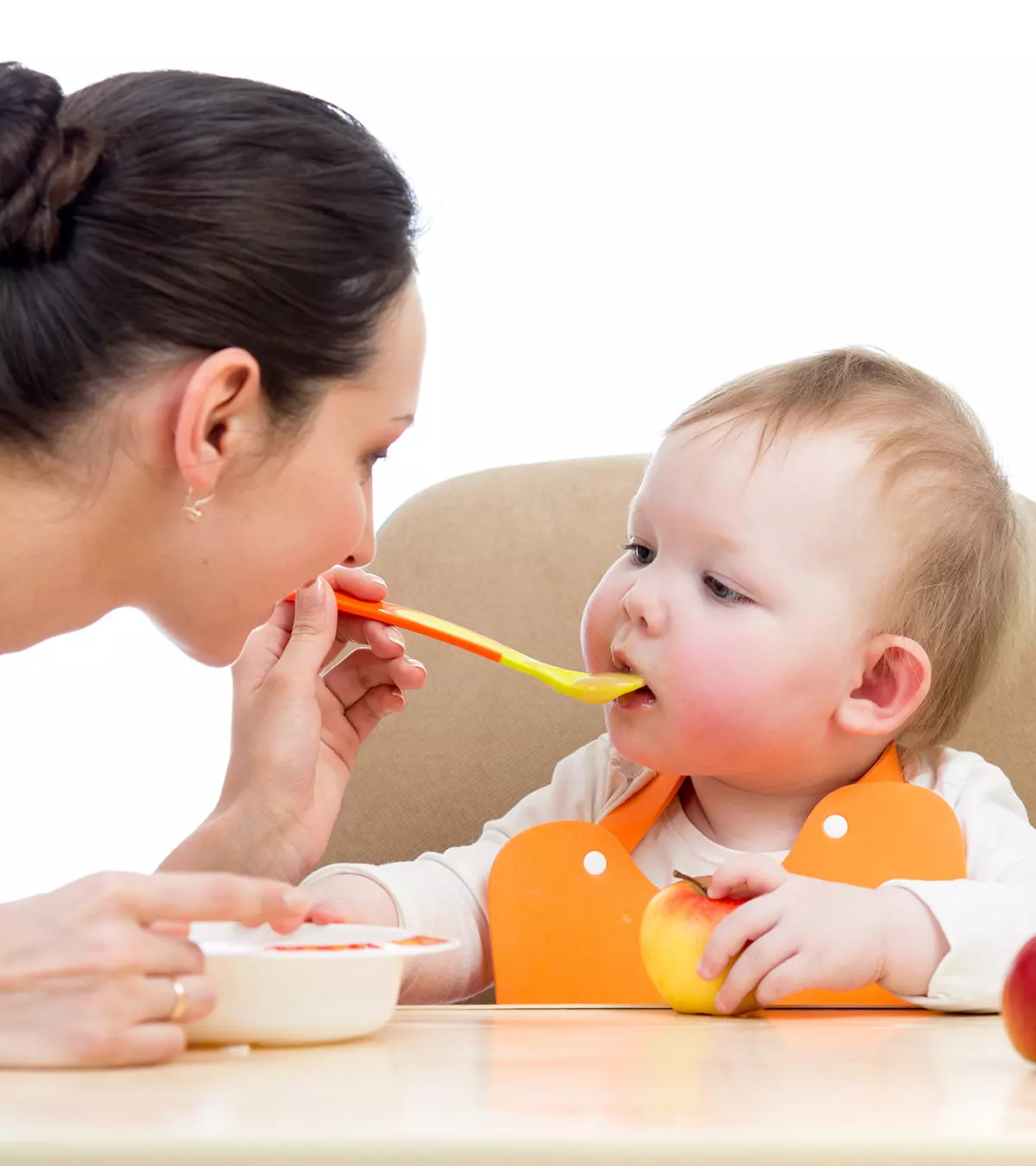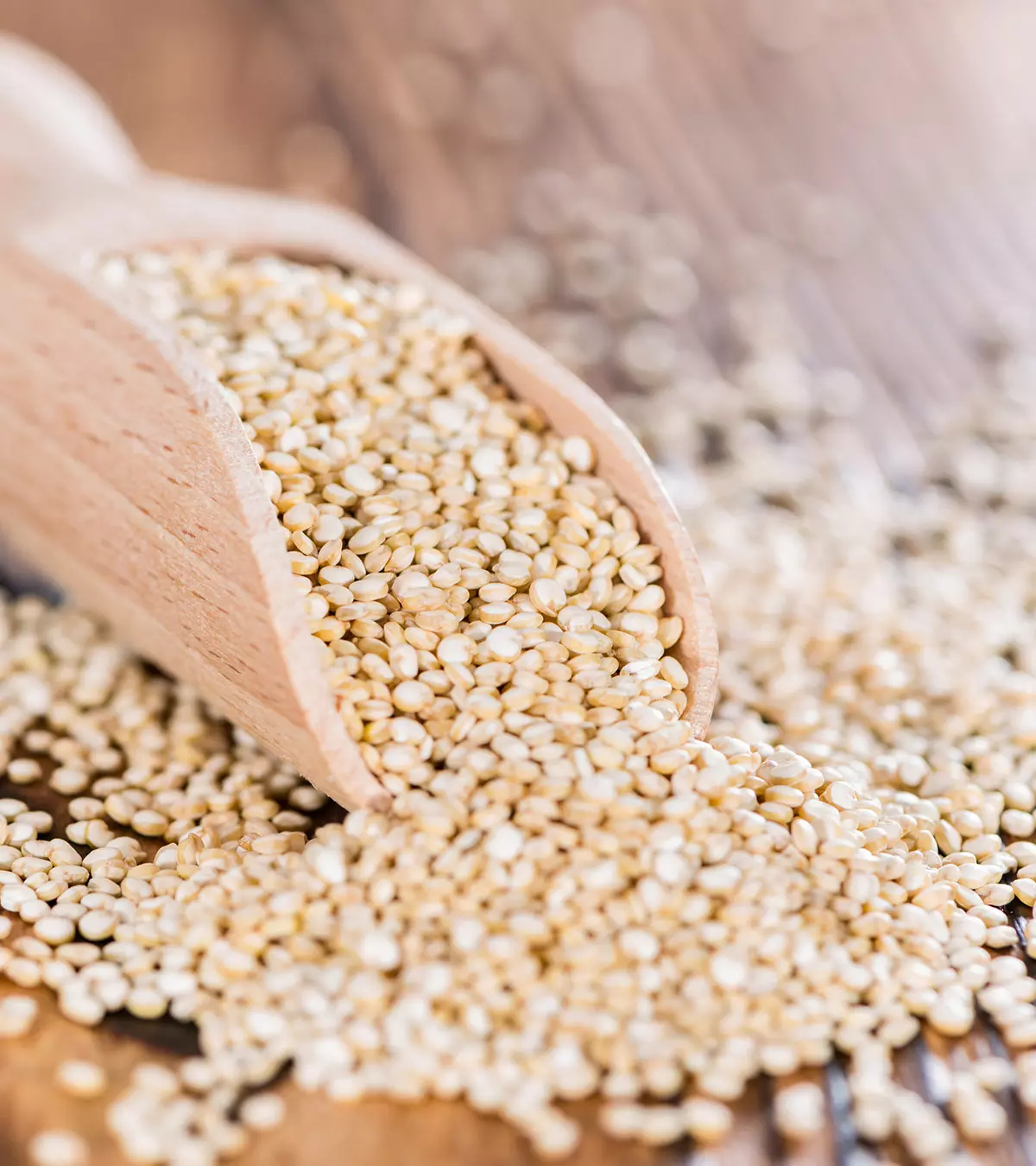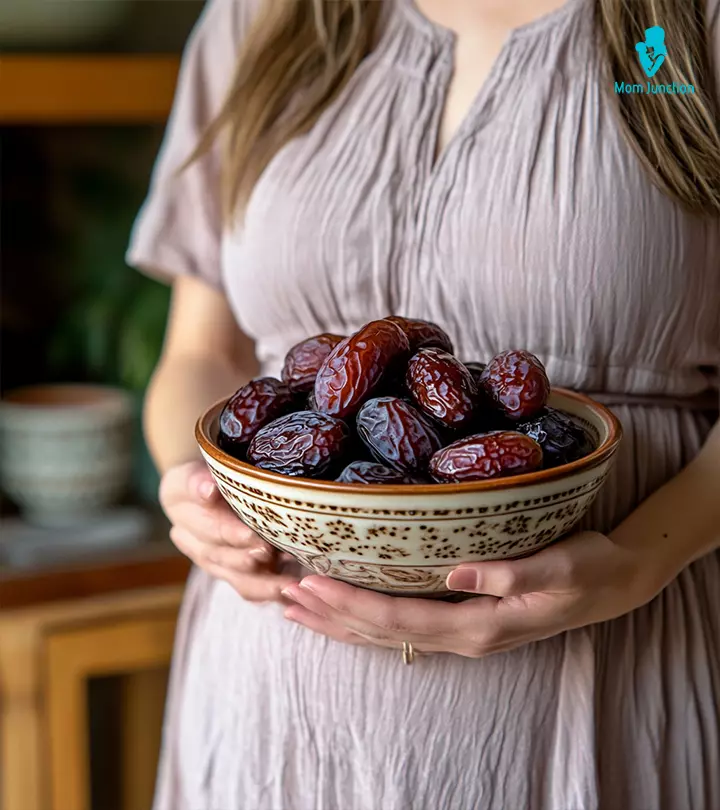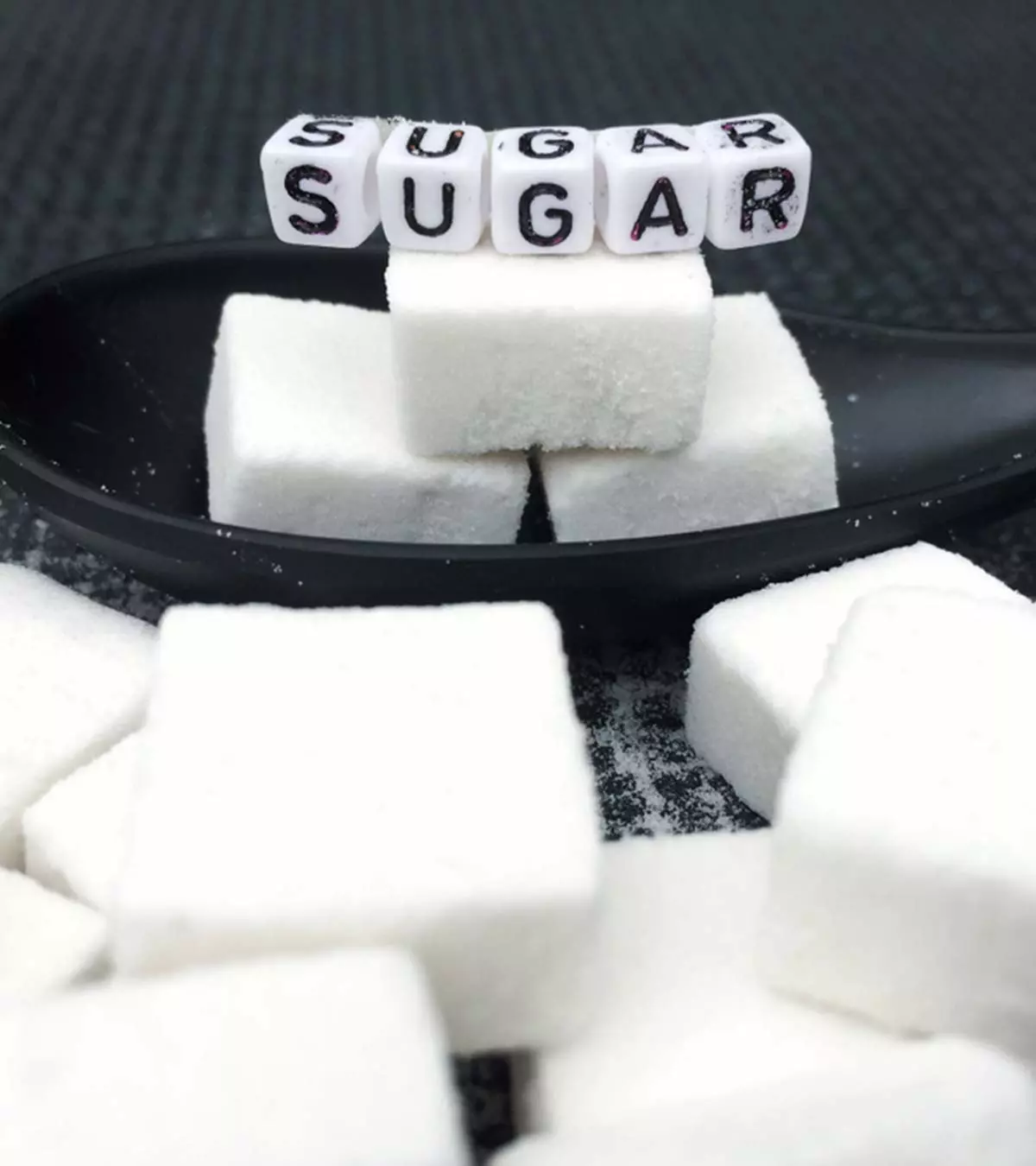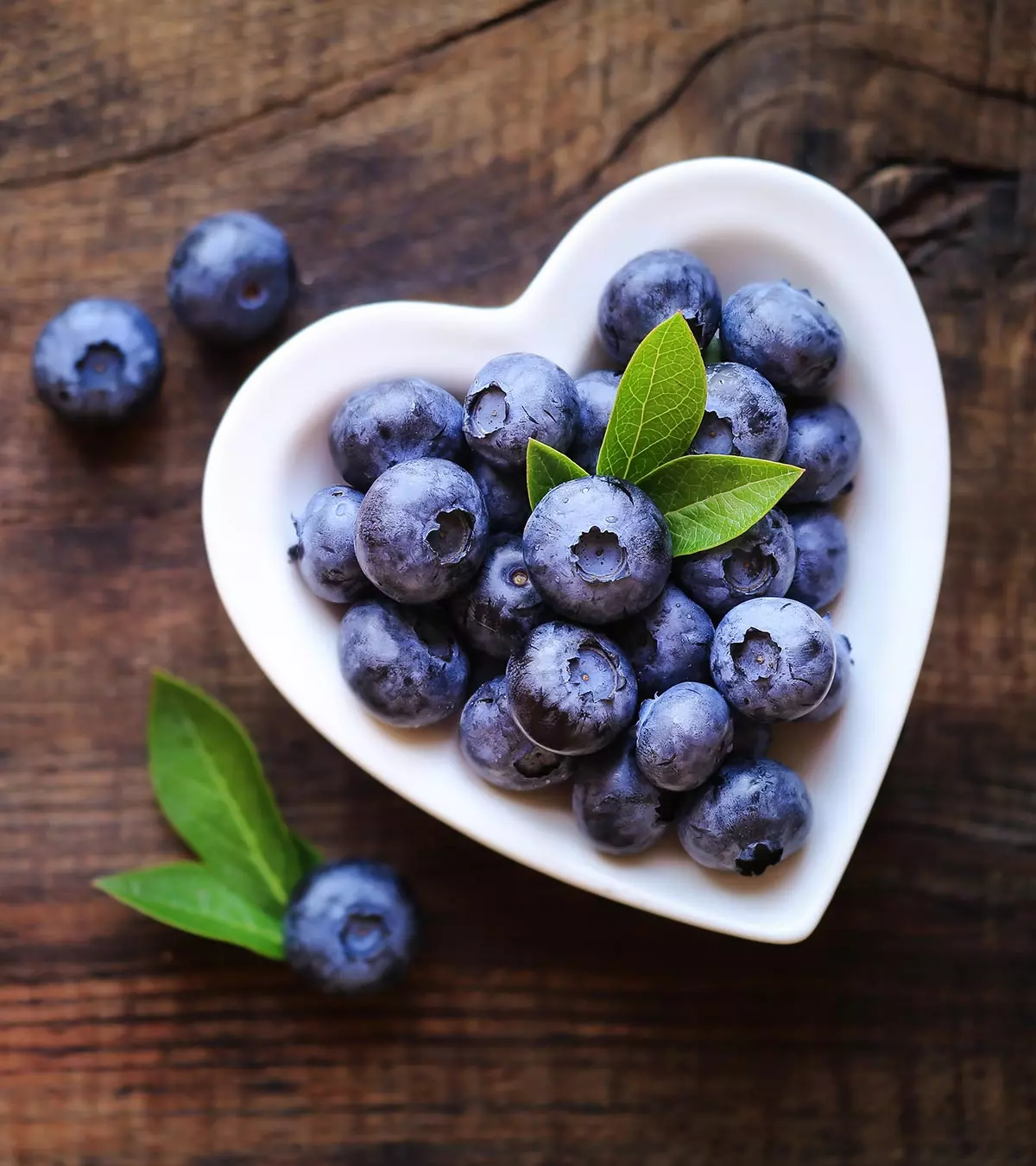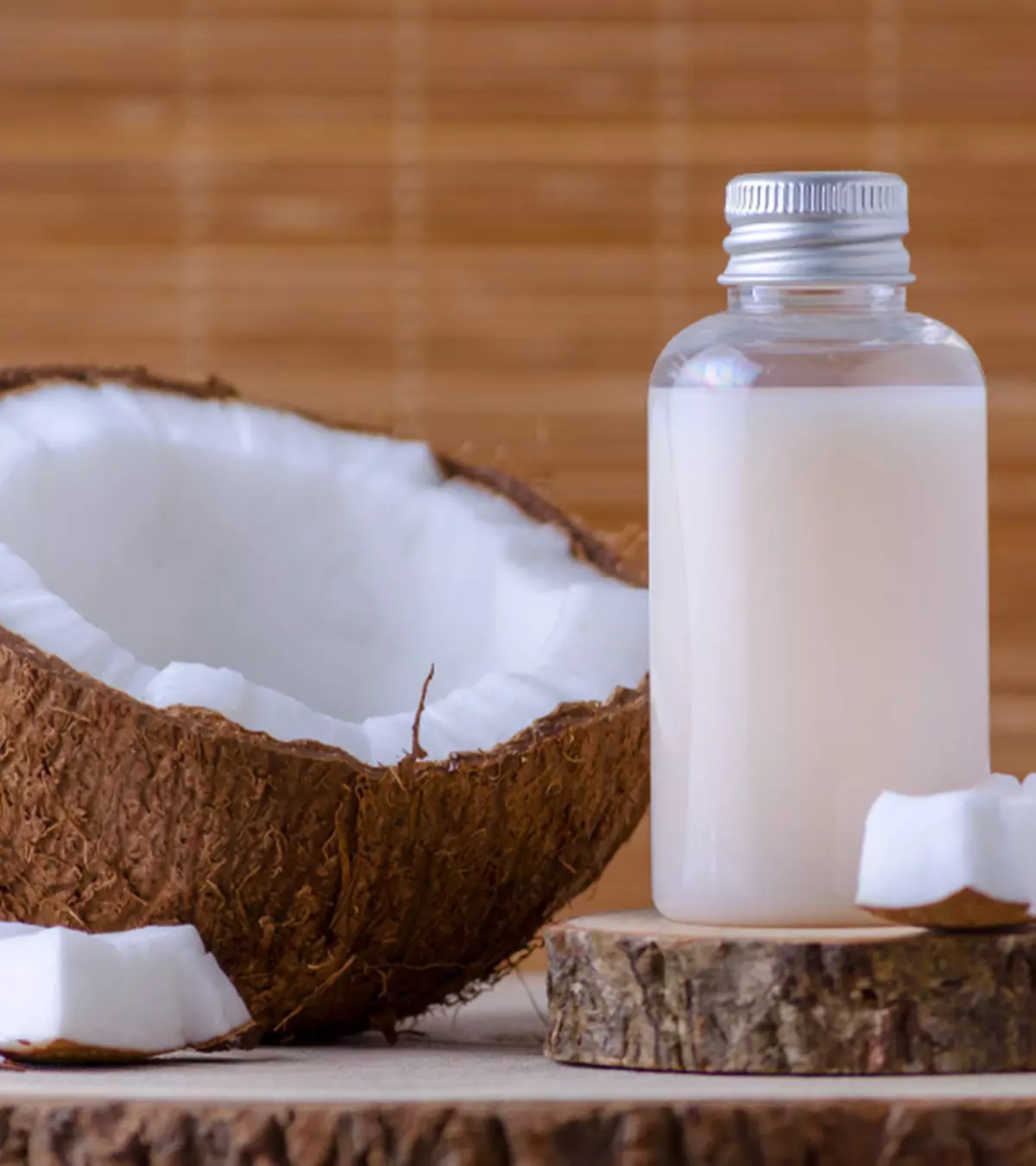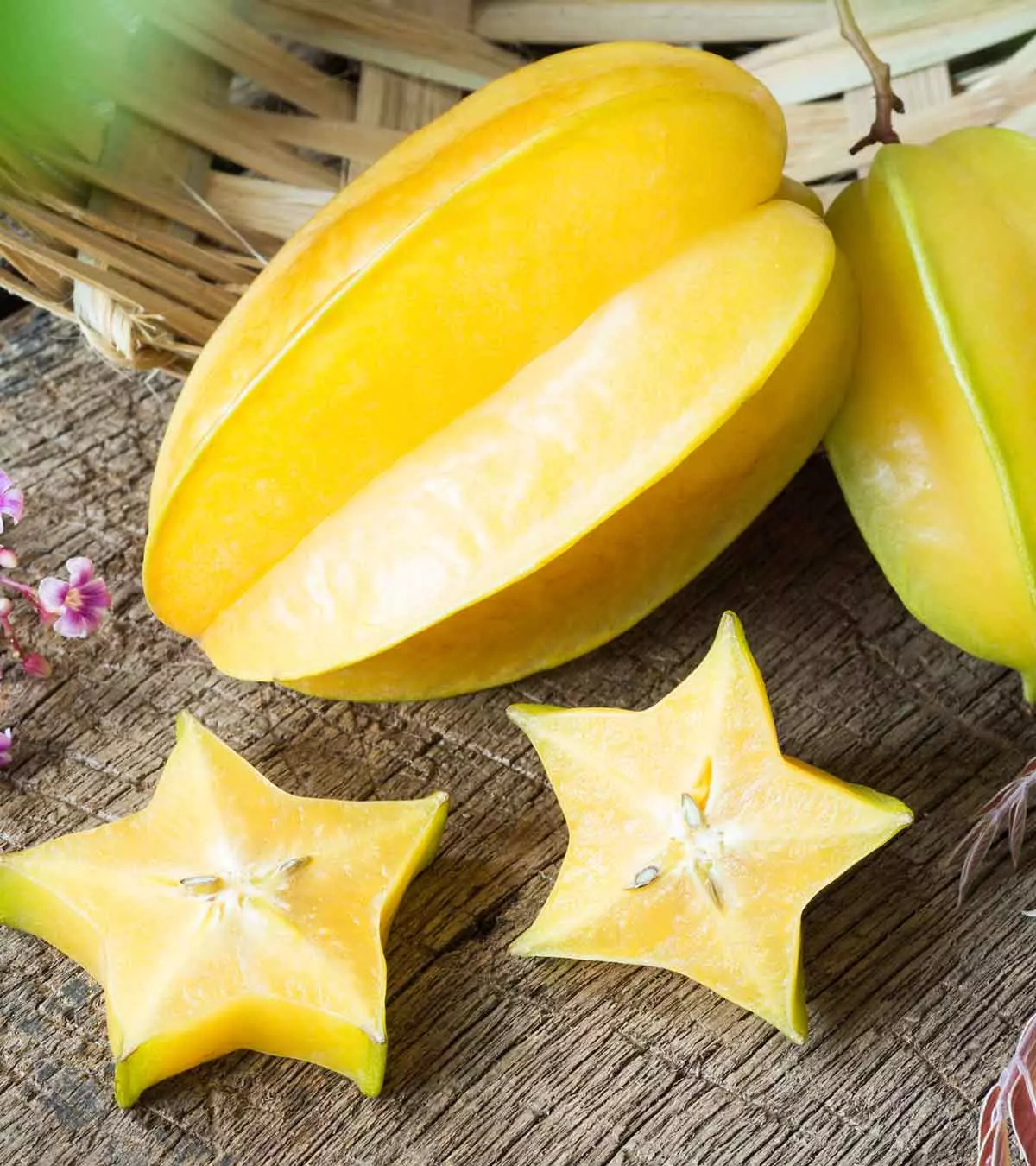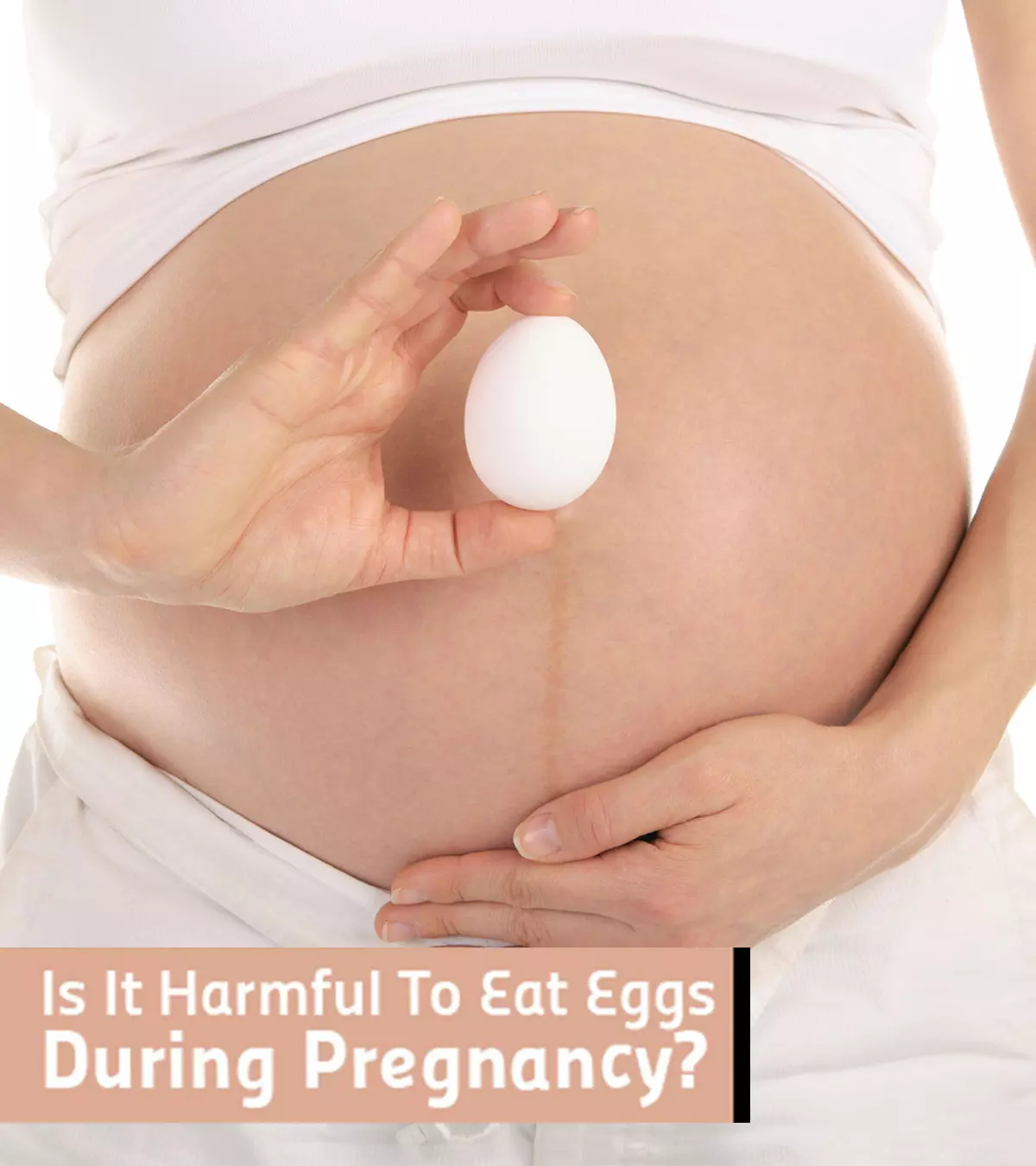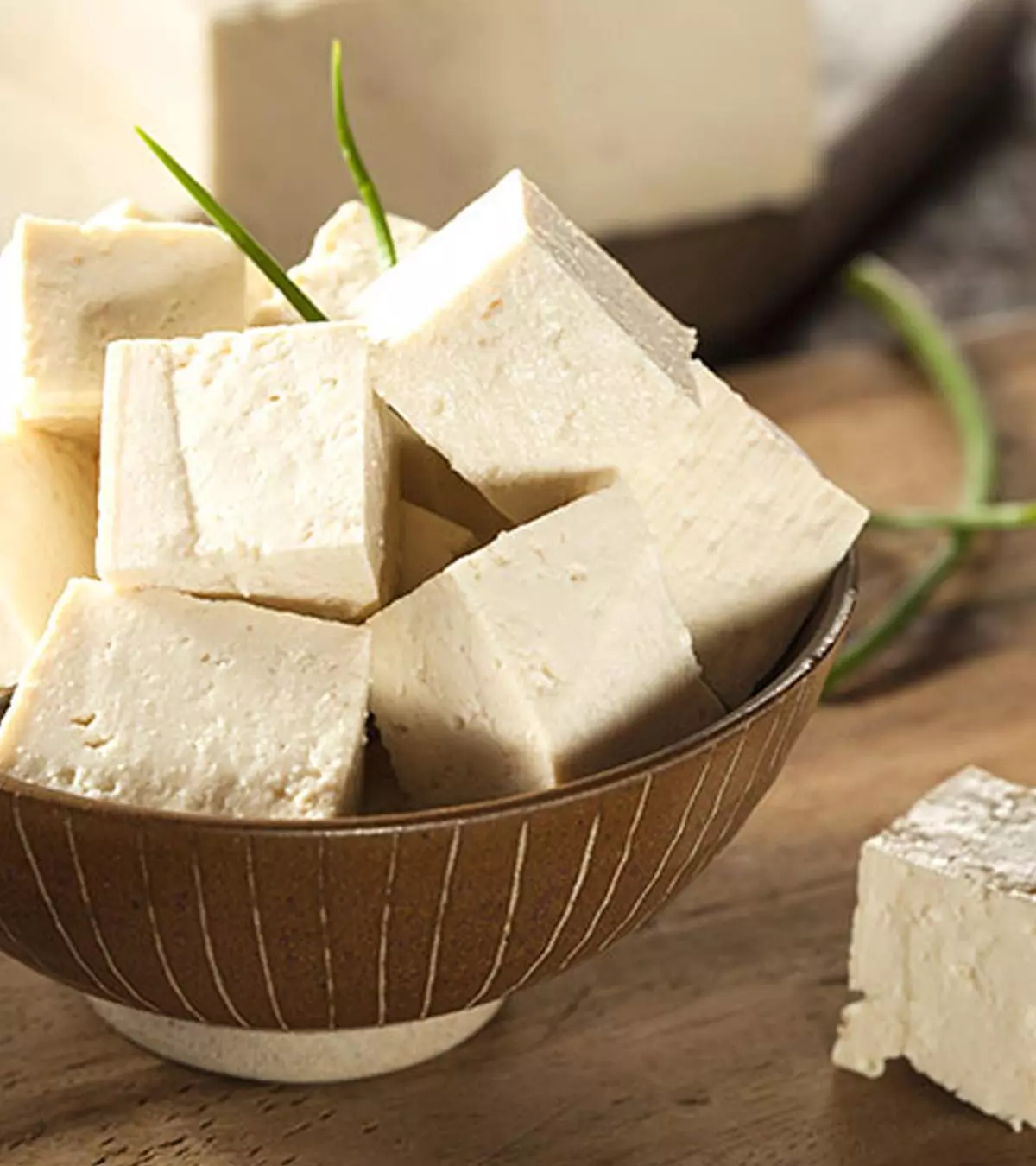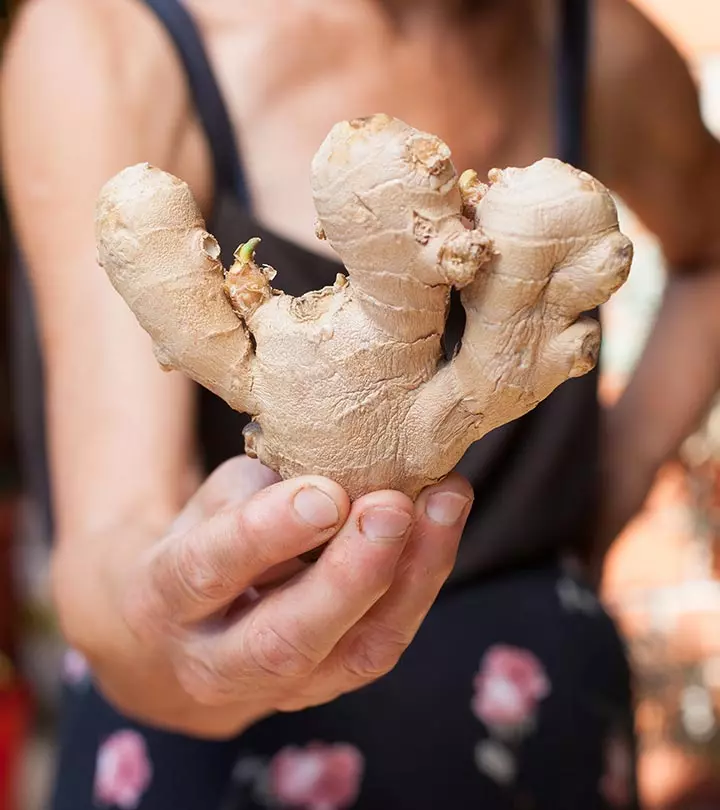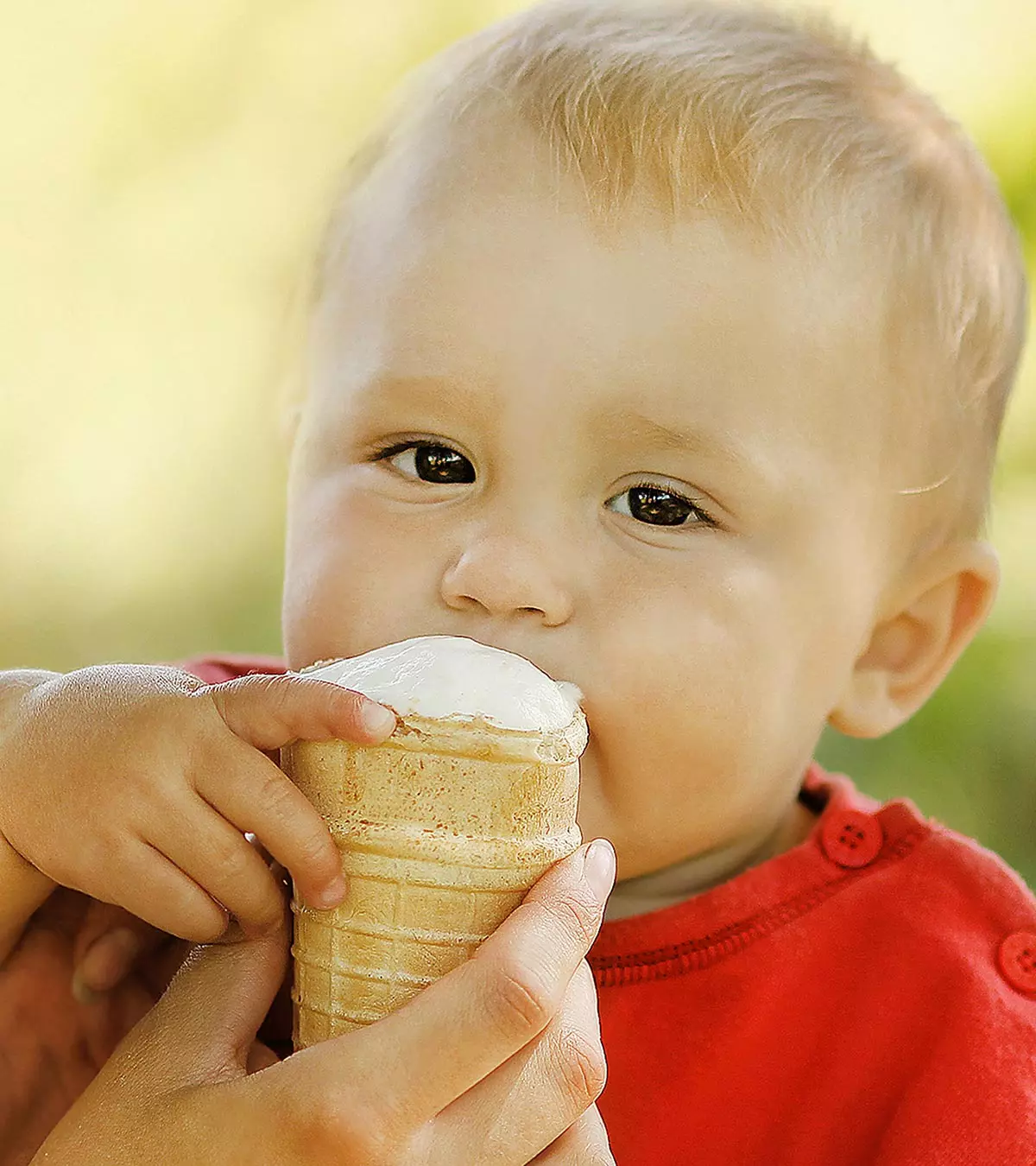
Image: Shutterstock
You may often wonder if you should introduce ice cream for babies. Ice cream can be as tempting for babies as they are for adults. Everyone loves ice creams, and it is difficult to stop ourselves from having them. However, considering the ingredients that go into store-bought ice cream, parents are often apprehensive about introducing them to their babies.
Read this post as we discuss the right age to start eating ice cream, the ingredients you should avoid, tips to follow when introducing ice creams to babies, and some simple recipes to make delicious ice creams at home for your babies.
Key Pointers
- Ice cream should be avoided for the first 12 months of a baby’s life to keep them safe from potential digestion issues.
- Ice cream must be introduced in moderation for babies after consulting with their pediatrician.
- When introducing ice cream, it is important to choose the right vendor, read the ingredients carefully, and not overfeed.
- Homemade ice cream is a safer alternative for babies, and other alternative desserts include homemade smoothies and chilled fruit purees.
- Banana ice cream and frozen yogurt ice cream are delicious and easy-to-make recipes for babies.
When Can Babies Have Ice Cream?
Babies can have ice cream after the age of 12 months, as it is a dairy product. Though it is made from whole milk and cream, pasteurized to remove bacteria, babies can still be sensitive to milk proteins, minerals, and other ingredients in it (1).
Texas-based pediatrician Dr. Lisa Ehl Lewis says, “The American Academy of Pediatrics recommends limiting refined sugar at all ages. Therefore, I don’t recommend giving your toddler ice cream often, as it is not essential to their diet.”
According to the Australian Guide to Healthy Eating, discretionary foods and drinks such as ice cream and other ice confections should be avoided as they do not help meet the infant’s nutrition needs (2). However, you can introduce ice-creams in moderation after consulting with a pediatrician and give them occasionally to the baby.
4 Reasons To Avoid Ice Cream For Babies Below One Year
The American Academy of Pediatrics advises offering healthy complementary foods or snacks to babies only after they turn nine months old (3). The first 12 months are crucial for your baby as you introduce nutritious food, and build a taste for healthy foods. Therefore, the first 12-month period is too early to feed your baby ice cream. Here are a few reasons why you should avoid ice cream during this time:
1. Preservatives
Almost all the ice creams in the market contain preservatives, fat, sugar, artificial ingredients, and food coloring (4). Experts recommend that babies under two avoid foods with added sugars, as it can lead to a preference for sweet foods (5). So, it is worth a wait until your baby’s first birthday.
2. Whole milk
Ice cream is a milk-based dessert and may be sensitive to whole milk and cream (6). If the baby is exclusively breastfed, he or she may not be exposed to cow milk. The baby may have lactose intolerance too.
 Experts say
Experts say3. Digestion issues
The whole milk and other ingredients in the ice cream may be hard for a baby to digest. The ice cream can lead to gas buildup and chronic pain in the stomach, or colic issues.
4. Risk of allergic reactions
Babies under one year of age are at an increased risk of developing sensitivities to milk proteins (6). It’s best to consult a pediatrician and wait until your baby is used to other types of milk before giving ice cream.
Next, we tell you how to introduce ice cream to your baby.
4 Tips To Introduce Ice Cream For Babies
Talk to your pediatrician before giving your baby an ice cream for the first time. Here are a few points to remember:
1. Say ‘no’ to street vendors
Most commercial ice creams are heat pasteurized to kill the bacteria but be careful from where you are buying it. Never buy ice cream from a street vendor because you can never be sure about the sanitary and storage conditions at such places.
Bacteria might build up in improper storage conditions. The water used by the local ice cream vendors may not be of the best quality. Poor water quality and contaminated milk could lead to gastrointestinal infections in the little one.
2. Be sure about the ingredients
Read the ingredient list carefully before offering ice cream to your little one. Certain ingredients could cause allergic reactions. Some common ingredients in ice cream, which could be allergic, are nuts, peanuts, strawberries, and coloring agents. Avoid ice creams made of raw milk–they are among the foods to avoid for babies as they can carry E. coli bacteria (7).
Choose a simpler ice cream without too many additional ingredients.
3. Do not overdo
Start with small bites. After introducing an ice cream, do not overfeed just because your little one is enjoying it. The sugar content can be harmful to your baby as too much of it could lead to potential tooth decay, and overweight in the long run.
Offer just a spoon or two at a time and not more than once in a week or two.
 Research finds
Research finds4. Offer alternatives
If your baby loves ice cream, you can feed them desserts such as homemade creamy smoothies, fruit milkshakes, flavored yogurt, fruit custard or pudding, fresh fruit slices, chilled fruit purees, natural fruit sorbets, and homemade fruit gelatos. Experts recommend providing alternatives to ice cream for babies, such as rice pudding or porridge (without sugar), along with healthier choices like unsalted rice cakes, bagels, and plain yogurt (8).
Chill them shortly before serving to give them the feel of ice cream. Exposure to ice cream can damage the pharynx mucosa, and abrasions in the pharynx can lead to pharyngitis. Avoid giving ice cream in the cold weather or if the baby sneezes or has a runny nose. Sweet-flavored ice creams, milkshake bars, and those without nuts are better.
Precautions For Introducing Ice Cream To Babies
When introducing ice cream to your baby, keep these safety tips in mind:
- Be cautious of allergies to ingredients like dairy, nuts, or eggs. Start with a small portion and observe for any adverse reactions.
- Use homemade or high-quality ice cream with minimal additives and avoid artificial sweeteners to ensure safer ingredients.
- Make sure the ice cream is blended to a soft, smooth texture to reduce the risk of choking.
- Introduce small amounts of ice cream the first time and monitor your baby for any signs of allergies or reactions.
- If your baby has digestive sensitivities, lactose intolerance, or other health issues, consult a pediatrician beforehand.
Simple Baby Ice Cream Recipes
Homemade ice creams for babies are safer than the commercial ones. You can be sure of the ingredients used in it so that the little one doesn’t have any allergies.
1. Homemade baby vanilla ice cream recipe (12+ months)
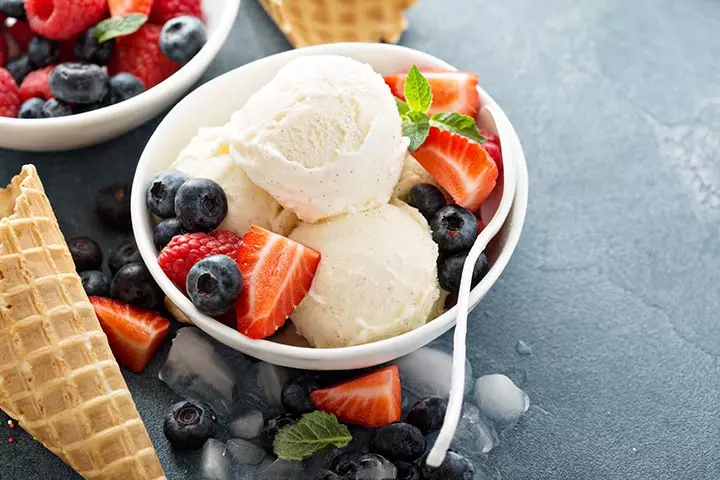
Preparation time: 5 minutes + freezing time
You will need:
- 1 ripe banana (peeled)
- 5 strawberries (hulled, cut)
- 1 hass avocado (pitted)
- 1/3 cup coconut milk (unsweetened)
- 1tsp coconut oil
- 1tsp vanilla extract (optional)
How to:
- Add all the ingredients to a blender and puree.
- Transfer it to a container and freeze for an hour. After removing from the freezer, stir well.
- Place it back into the freezer. Continue the process until it reaches the desired consistency.
Note:
Substitute strawberries with some other fruit like mango, if your baby has not tried it earlier or is allergic to the fruit. You can make a straight banana version too.
You may even use other ingredients to make the ice cream nutritious. Try some veggies, which have a sweet flavor and texture when cooked, like mashed sweet potato, boiled carrots, and sweet corn.
2. Banana ice cream
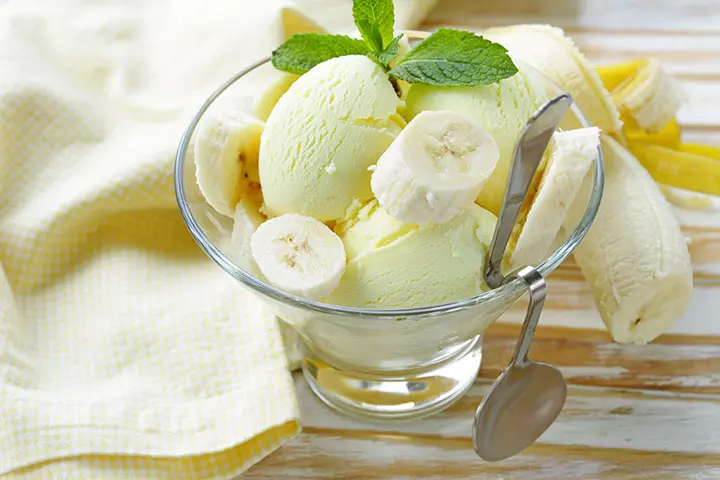
Preparation time: 5 minutes+ freezing time
You will need:
- 1 ripe, frozen banana
- 1tsp cocoa powder
How to:
- Throw the frozen banana in a blender, add cocoa powder and run.
- Adding a scoop of almond butter or peanut butter would make it a healthy snack.
Note:
Frozen banana is perfect for soothing a teething baby’s sore or tender gums.
Laura Vitale, a mother and vlogger, shares her toddler’s favorite no-sugar, yogurt-based banana ice cream recipe, “The ingredients are simple. You need some ripe banana, plain Greek yogurt, and almond butter (do not use it if your baby has nut allergies). I blend all the ingredients in a food processor and blend them until the mixture is smooth. Next, I cover it, put it in a tightly sealed container, and pop it into the freezer. If you take it straight out of the freezer and try to scoop it, it’ll be really hard. You’ll want to take it out about 20 minutes before serving so it softens a bit and becomes perfectly scoopable. It’s not going to be super creamy when you first pull it out of the freezer, but it’s creamy, sweet enough, and very delicious (i).”
3. Breastmilk ice cream
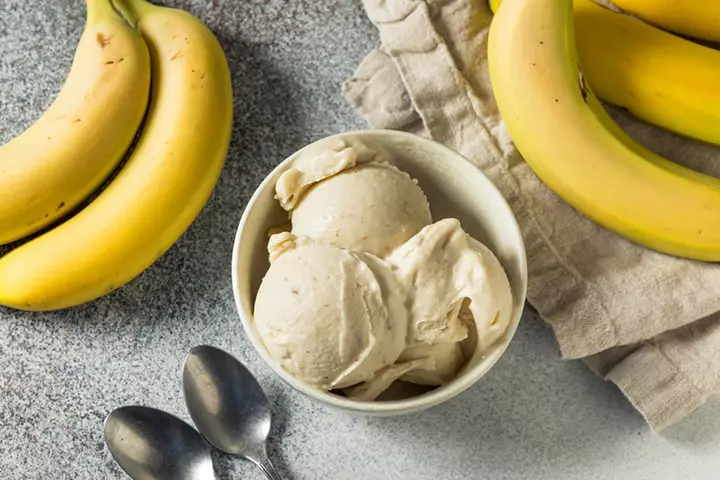
Preparation time: 10 minutes + freezing time
You will need:
- 1 sliced banana
- 2oz. breast milk
- ¼ – ½tsp cinnamon
- ½tsp vanilla extract (optional)
How to:
- Chop your banana and put it in the freezer for a minimum of 2 hours.
- Combine the frozen banana with cinnamon and vanilla extract in a blender.
- Gradually pour in breast milk and blend until the mix becomes similar to soft-serve ice cream.
- Feed it to your baby immediately or store it in the freezer for future use.
Note:
Sealable plastic bags can be used as an alternative to bowls or containers for freezing.
4. Vanilla frozen yogurt ice cream
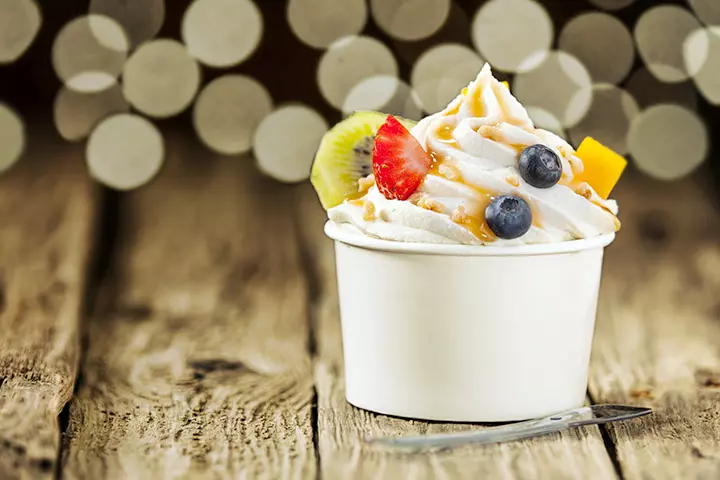
Preparation time: 5 hours 5 minutes
You will need:
- 3 cup Greek yogurt
- 2/3 cup brown sugar
- 1tsp vanilla extract
How to:
- Mix sugar, yogurt, and vanilla extract in a bowl. Cover it with a lid and refrigerate.
- Pour the chilled mix into an ice cream maker and freeze again until it reaches the soft-serve consistency.
- Transfer to a plastic container, cover with plastic wrap.
 Quick tip
Quick tip5. Chocolate ice cream
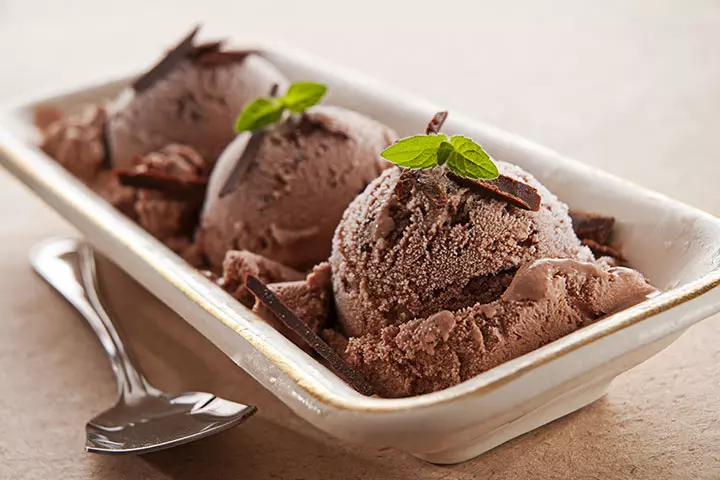
Preparation time: 20 minutes
You will need:
- ½ cup unsweetened cocoa powder
- ¼ cup brown sugar
- ½ cup sugar
- ¾ cup cream milk
- 1 ½ cup cream
- 1 ½ tsp vanilla extract
- a pinch of salt
How to:
- Mix cocoa and sugar in a bowl. Gently add milk and continue mixing for five minutes.
- Add cream, vanilla extract and salt to the mix and stir well.
- Transfer the mixture into ice cream maker and churn for 20 minutes.
- Freeze until hard.
Frequently Asked Questions
1. When can babies have ice pops?
Homemade fresh fruit frozen popsicles may be given to babies nine months or older. However, popsicles should not be given too often as the cold may cause a condition known as popsicle panniculitis (usually harmless and resolves within a few weeks). It occurs when the cheeks become reddish due to an inflammation of the subcutaneous tissue of cheek skin caused by cold exposure (9).
2. Can babies eat ice blocks?
Ice cubes should not be given to babies as they may be a choking hazard (7). They may also cause popsicle panniculitis (9).
3. What are the signs of an ice cream intolerance in babies?
Ice cream intolerance may stem from lactose intolerance or if babies are sensitive to milk proteins. If your baby is lactose intolerant and has ingested milk ice cream, you may notice symptoms such as loose stools, flatulence, bloating, nausea, swelling, breathing difficulties, redness in the eyes, and stomach cramps (11) (12).
On a hot sunny day, you may be tempted to feed ice cream to your baby. But ice cream for babies may not be as harmless as they are for adults. Babies’ immune system is still in the developing stage, and hence they may be sensitive to different ingredients present in the ice creams. Before introducing them to your baby, wait until they are 12 months old and consult your child’s doctor about feeding the right quantity. Furthermore, instead of buying store-bought ice cream, you can try a variety of nutritious homemade ice cream recipes for your baby.
Infographic: Ice Cream Treats For Babies Above One
There would be hardly anybody who does not like ice cream, so babies are no exception. Therefore, we give you some simple homemade ice cream recipes in this infographic that are high on nutrition and taste to serve your babies after they cross their one-year mark. Illustration: Momjunction Design Team
Illustration: Important Things You Must Know When Giving Baby Ice Cream
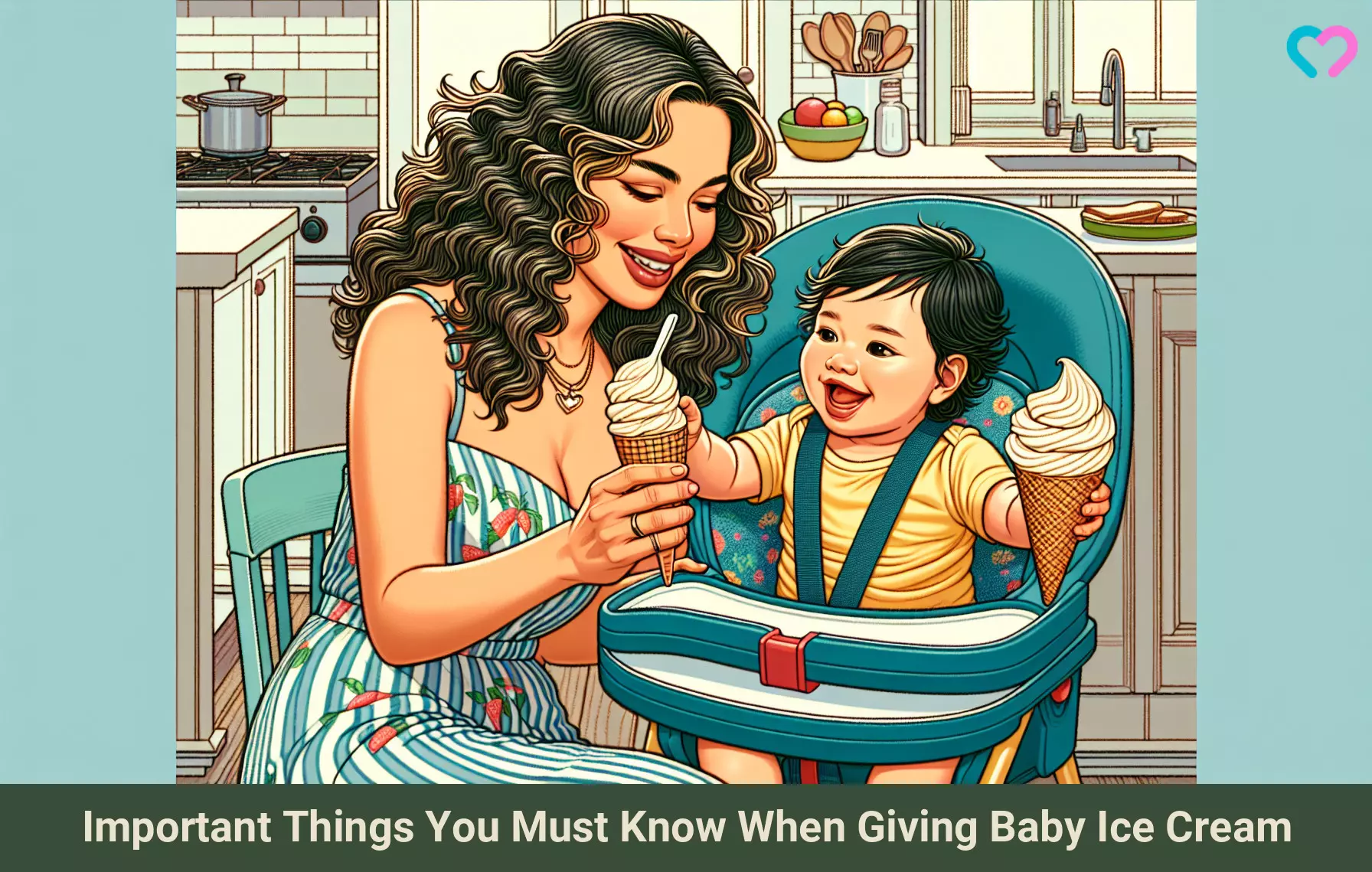
Image: Stable Diffusion/MomJunction Design Team
Find delectable and nutritious frozen delights crafted specifically for infants and young children! Explore recipes for creating wholesome ice cream that will enchant the palates of your cherished little ones.
Personal Experience: Source
MomJunction articles include first-hand experiences to provide you with better insights through real-life narratives. Here are the sources of personal accounts referenced in this article.
i. 3 Ingredient Baby Ice Creamhttps://www.youtube.com/watch?v=XsFD-FjnUBk
References:
- Why Formula Instead of Cow’s Milk?; Healthy Children; American Academy of Pediatrics
https://www.healthychildren.org/English/ages-stages/baby/formula-feeding/Pages/Why-Formula-Instead-of-Cows-Milk.aspx - Healthy eating for babies and young children; Government of South Australia
https://www.sahealth.sa.gov.au/wps/wcm/connect/public+content/sa+health+internet/healthy+living/healthy+eating/healthy+eating+at+different+ages+and+stages+of+your+life/healthy+eating+for+babies+and+young+children - Infant Food and Feeding; American Academy of Pediatrics
https://www.aap.org/en/patient-care/healthy-active-living-for-families/infant-food-and-feeding/#:~:text - Ice, Cream… and Chemistry; ACS Publications
https://www.acs.org/education/chemmatters/past-issues/archive-2013-2014/ice-cream-chemistry.html - Linda G Snetselaar et al.; Dietary Guidelines for Americans, 2020–2025; Nutrition Today (2021)
https://pmc.ncbi.nlm.nih.gov/articles/PMC8713704/ - Cow’s Milk Alternatives: Parent FAQs; Healthy Children; American Academy of Pediatrics
https://www.healthychildren.org/English/healthy-living/nutrition/Pages/Milk-Allergy-Foods-and-Ingredients-to-Avoid.aspx - Raw Milk; CDC
https://www.cdc.gov/food-safety/foods/raw-milk.html - Introducing Solid Foods; National Health Service
https://assets.publishing.service.gov.uk/media/5a7c29a3ed915d0b036b56df/dh_125828.pdf - A to Z: Panniculitis, Popsicle
https://kidshealth.org/CHOC/en/parents/az-panniculitis.html - Choking Prevention for Children; New York State Department of Health
https://www.health.ny.gov/prevention/injury_prevention/choking_prevention_for_children.htm - 5 Can’t-Miss Signs That Your Child Is Lactose Intolerant; Cleveland Clinic
https://health.clevelandclinic.org/5-cant-miss-signs-child-lactose-intolerant - Milk Allergies; Children’s Hospital of Philadelphia
https://www.chop.edu/conditions-diseases/milk-allergies - Luisma Sanchez-Siles et al.; Less Sugar and More Whole Grains in Infant Cereals: A Sensory Acceptability Experiment With Infants and Their Parents; Frontiers (2022)
https://www.frontiersin.org/journals/nutrition/articles/10.3389/fnut.2022.855004/full
Community Experiences
Join the conversation and become a part of our nurturing community! Share your stories, experiences, and insights to connect with fellow parents.
Read full bio of Dr. Mubina Agboatwalla
- Dr. Lisa Ehl Lewis is board certified in pediatrics by the American Board of Pediatrics and is a Fellow of the American Academy of Pediatrics. She works in Fort Worth, Texas and has over 20 years of experience.
 Dr. Lisa Ehl Lewis is board certified in pediatrics by the American Board of Pediatrics and is a Fellow of the American Academy of Pediatrics. She works in Fort Worth, Texas and has over 20 years of experience.
Dr. Lisa Ehl Lewis is board certified in pediatrics by the American Board of Pediatrics and is a Fellow of the American Academy of Pediatrics. She works in Fort Worth, Texas and has over 20 years of experience.
Read full bio of Dr. Ritika Shah
Read full bio of Swati Patwal
Read full bio of Ghazia Shah






